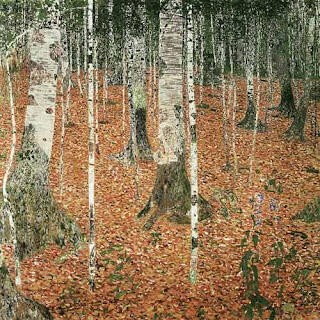The Singular and Cheerful Life by Mary Oliver from Evidence (Beacon Press)
The singular and cheerful life
of any flower
in anyone's garden
or any still unowned field--
if there are any--
catches me
by the heart,
by its color
by its obedience
to the holiest of laws:
be alive
until you are not.
Ragweed,
pale violet bull thistle,
morning glories curling
through the field corn;
those princes of everything green--
the grasses
of which there are truly
an uncountable company,
each on its singular stem
striving
to rise and ripen.
What, in the earth world,
is there not to be amazed by
and to be steadied by
and to cherish?
Oh, my dear heart,
my own dear heart,
full of hesitations,
questions, choice of directions,
look at the world.
Behold the morning glory,
the meanest flower, the ragweed, the thistle.
Look at the grass.
 "Look at the grass."
"Look at the grass."
It was what I told myself as I stood on a narrow dirt path with the Irish Sea raging below me. In the not-too-far-away distance was Middle Mouse, or Ynys Badrig (Patrick's Island), home to razorbills and cormorants and the northern most point in Wales. But I couldn't pause to do any bird spotting or stop and take in the dramatic view. My only focus was getting back the path I'd come across without being swept over the edge by the gale force winds or, more likely, stumbling over my own feet and tumbling down the rocky hill into the sea below me.
The initial walk to where I was hadn't been nearly as petrifying. I was wandering around the churchyard at Llanbadrig on Anglesey Island, trying to find a solitary place to perch when I first spied the path.
 Many of my fellow pilgrims had gone away from the churchyard, up and over the hills to a bench where the Dalai Lama had reportedly sat for a while before proclaiming the seascape the most beautiful view he'd ever seen. Others remained inside the sanctuary of the small church, admiring the Islamic inspired stained glass windows, chatting with the ladies filling the church with flowers for Sunday, and trying to stay out of the fierce wind.
Many of my fellow pilgrims had gone away from the churchyard, up and over the hills to a bench where the Dalai Lama had reportedly sat for a while before proclaiming the seascape the most beautiful view he'd ever seen. Others remained inside the sanctuary of the small church, admiring the Islamic inspired stained glass windows, chatting with the ladies filling the church with flowers for Sunday, and trying to stay out of the fierce wind.
I was walking among the graves, as I often like to do, but even the presence of those dearly departed felt like too much company for me at the time. So when I looked over the wall and saw the narrow grass and dirt path leading away from the church and the hill with the amazing view, I decided to follow it.
And follow it I did, marveling at the ombre of blues as sea met sky in the distance, wondering if the path really went through the mass of gorse ahead (as you can see by the picture it did), and wondering about the centuries of footsteps that had flattened and worn away the grass. Perhaps even St. Patrick himself had walked along that very cliff after he'd recovered from his little ship wreck adventure.
At the point where there was little spare land between my feet and a rocky cove below, the path turned away from the sea and wound its way up into green fields spotted with suspicious ewes who bleated warnings at their lambs as I approached.
I debated walking further but decided not to disturb the sheep so I turned to head back and I froze. For the first time I noticed how narrow the path was, how uneven, how undefined at places. And that wind! Did it just start blowing that hard or had I not noticed the effort it took to remain upright as it howled around me? I thought about turning around again and continuing along the path through the sheep fields but rather than heading back towards the road, it looked like it just continued along the sea, albeit at a safer distance from the rocks and water.

So I made my way back the way I came, placing one foot in front of the other, testing the sureness of the path, feeling for hidden dips or unseen stones that would send me careening down into the angry waters of the Irish Sea, the sight of which now caused my heart to quicken with fear. I avoided looking at the drop by focusing my peripheral vision on the other side of the path. "Look at the grass," I'd tell myself, look at the grass." Of course, I made it back just fine and in one piece, albeit with my muscles a bit more tense than when I started.
It wasn't until I got home and was looking at the pictures from Llanbadrig that I realized the lesson for me in that walk. Too often I embark upon a path with fear and hesitancy, rather than wonder and curiosity. I get caught up in the narrowness of the track and the fierceness of the wind and when I do that, I expend much more energy-- mental and physical-- in inching forward than if I just trusted the way and admired the view. Or even worse, I stay stuck where I am, in a place of perceived safety. That walk along the path at St. Patrick's Church has become a touchstone for me, a reminder to act out of a place of trust and love rather than fear and doubt. For as Mary Oliver writes, "What, in the earth world/is there not to be amazed by/and to be steadied by . . . Look at the grass."







































